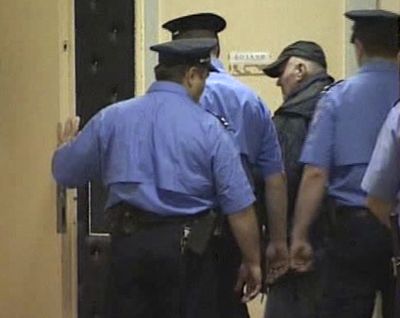Serbia arrests Mladic on war crimes charges
Capture ends 16-year manhunt

BELGRADE, Serbia – After 16 years on the run, a frail and haggard Ratko Mladic was hauled before a judge Thursday – the first step in facing charges for international war crimes, including the slaughter of 8,000 Muslim men and boys in the Bosnian town of Srebrenica in 1995.
No longer the fearsome, bull-necked military commander, Mladic was arrested by intelligence agents in a raid before dawn at a relative’s house in a village in northern Serbia. The act was trumpeted by the government as a victory for a country worthy of European Union membership and Western embrace.
Mladic, 69, was one of the world’s most-wanted fugitives. He was the top commander of the Bosnian Serb army during Bosnia’s 1992-’95 war, which killed more than 100,000 people and drove another 1.8 million from their homes. Thousands of Muslims and Croats were killed, tortured or driven out in a campaign to purge the region of non-Serbs.
He was accused by the U.N. International Criminal Tribunal in The Hague, Netherlands, of genocide, crimes against humanity and war crimes for the massacre of Muslims by Bosnian Serb forces in eastern Bosnia and the relentless four-year siege of Sarajevo.
On Thursday evening, Mladic walked haltingly into a closed-door extradition hearing in Belgrade, where he asserted through his attorney that he will not answer to the authority of the U.N. tribunal.
Mladic’s lawyer, Milos Saljic, said the judge cut short the questioning because his client’s “poor physical state” left him unable to communicate.
“He is aware that he is under arrest, he knows where he is, and he said he does not recognize The Hague tribunal,” Saljic said, adding that Mladic needs medical care and “should not be moved in such a state.”
Belgrade B-92 radio said one of Mladic’s arms was paralyzed – probably the result of a stroke.
Extradition proceedings could take a week or more before Mladic’s expected transfer to The Hague, where he faces life imprisonment. The U.N. court has no death penalty.
The Serbian government, which has changed mightily while Mladic was at large, banned all public gatherings and tightened security in the country to prevent ultra-nationalists from making good on pledges to pour into the streets in protest.
President Boris Tadic appeared jubilant at a news conference announcing Mladic’s capture.
“We have ended a difficult period of our history and removed the stain from the face of Serbia and the members of our nation wherever they live,” he said.
A Serbian official close to Tadic told the Associated Press that the president had personally overseen the arrest operation, and compared it to President Barack Obama’s involvement in the hunt for Osama bin Laden.
But the raid in the village of Lazarevo, 60 miles northeast of Belgrade, was no Navy SEAL operation and the Serbian intelligence agents didn’t have to fire a shot. Mladic put up no resistance.
“They didn’t even wake us up,” said a resident who identified himself only as Zoran.
He and other residents of the village of 2,000 people insisted they had no idea Mladic was living in their midst.